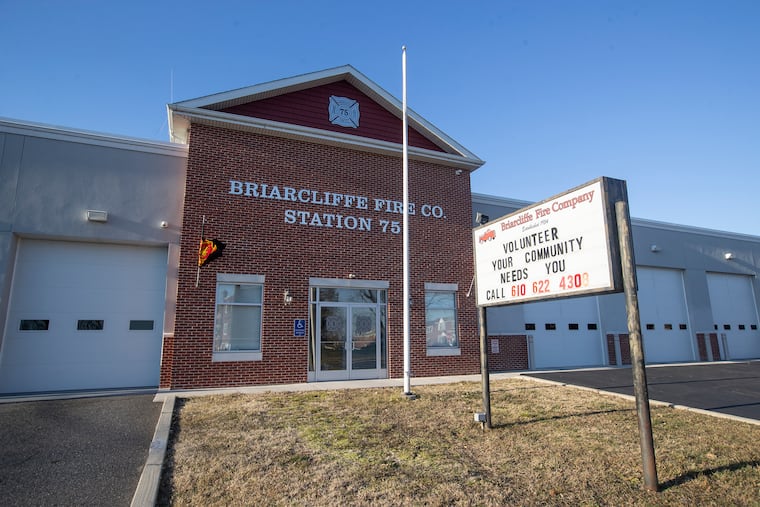Racist remarks shuttered a Delco fire company. Then county officials created a course to better train public safety leaders.
After Briarcliffe Fire Company disbanded amid a controversy over racist remarks, Delaware County leaders partnered with Villanova to create a leadership program for fire and police departments.

When members of the Briarcliffe Fire Company in Glenolden were recorded on a Zoom call making racist comments about residents of the Delaware County community, their remarks sparked a public outcry.
Unaware that they were still being recorded after a virtual meeting with a neighboring fire company, Briarcliffe firefighters used racial epithets and said they wanted to leave town as more people of color moved in. One member of the volunteer department even mocked 8-year-old Fanta Bility, the Sharon Hill girl who was killed by police officers responding to a shooting outside a high school football game.
Amid a backlash of community outrage, Briarcliffe suspended service, and its members later voted to disband amid the mounting public pressure.
It was a “dark day” for Delaware County, according to Tim Boyce, the director of the county’s Department of Emergency Services and the man responsible for overseeing emergency dispatch and responses to fires, floods and other disasters. And it was a situation Boyce said he was unprepared to address, despite his 30 years of experience.
“If the community lacks faith in calling 911 and feeling respected, whether it’s police, fire or EMS, it’s everyone’s problem,” he said.
So Boyce sought to fix that countywide, helping current and future public safety leaders avoid similar crises. And for help, he turned to Villanova University’s College of Professional Studies, whose faculty crafted a program designed to better train the people leading fire and police departments in the county.
“A lot of public safety training is homeschooled: We learned from our predecessors how to lead and communicate, and I’m just not sure it’s been effective,” Boyce said. “In public safety, that training is about focusing on the problem at hand.”
The leadership course, similar to the master’s-level curriculum offered to executives in business and other fields, was tailored to fire chiefs, police officers, and public-safety officials working in Boyce’s department.
The six-week program pushed its students to look beyond their technical training and focus on how to best motivate and lead their colleagues, both when under pressure while dispatched to an emergency scene, or when dealing with personnel issues, according to Christine Palus, dean of the College of Professional Studies.
Professors from Villanova placed emphasis on engaging with community members and being sensitive to the tension those interactions sometimes carry. And they stressed how to motivate colleagues to work well with each other.
Those aspects of the job, Palus said, are not always covered in routine fire and police courses, but they are as essential to first responders as they are for people managing boardrooms.
“The principles that we talked about, good communication, inclusive leadership, are relevant for everyone,” Palus said. “But for them as public servants, it adds another layer in understanding who they are and how they are serving their own communities.”
The first, 22-member class of CLIMB (Communicate with Clarity, Lead with Ethics, Include by Design, Motivate on Purpose and Build a Collaborative Structure) graduated in late February.
One of those graduates, Upper Darby Police Sgt. Kristine McAleer, said the lessons in communication resonated with her, especially while patrolling a borough nicknamed “the world in one place,” where 24% of the population was born in other countries.
“We’re all just looking for a successful outcome, whether dealing with someone in the community who needs help or talking with people working in the local firehouse,” she said. “Understanding a situation and understanding other people’s cultures helps you get your message across successfully, and that all comes down to understanding people.”
McAleer and her classmates were chosen by Boyce and Delaware County Council Chair Monica Taylor, identified for their leadership roles, or potential to become leaders in their various departments and organizations in the coming years.
John Hudyma, the second-generation chief of the Holmes Fire Company in Ridley Township, said the role of a volunteer fire chief has changed dramatically since the days when his father held the title.
Today, the focus has shifted from primarily fighting fires to dealing with what Hudyma called the “human resources aspect of it,” including business concerns and interacting with municipal leaders.
So he jumped at the chance, he said, to receive the lessons offered through CLIMB.
“Where the rubber meets the road is dealing with and interacting with the people, and the Villanova course really gave us more to think about,” he said. “In my 12 years as chief, I’ve had folks with personal, home-life issues, folks that have had substance-abuse and mental health issues. I’ve never had any formal training in any of that.
“I can only rely on some of the officer classes that I had taken previously, but they don’t cover a full range of that,” he said. “They don’t tell you how to manage those situations.”
But, Hudyma said, the Villanova course did exactly that, filling that gap in his training.